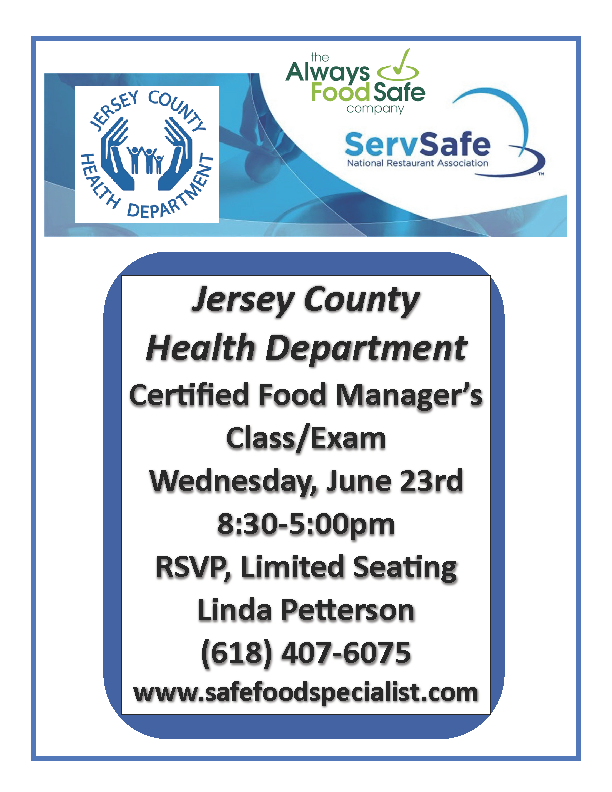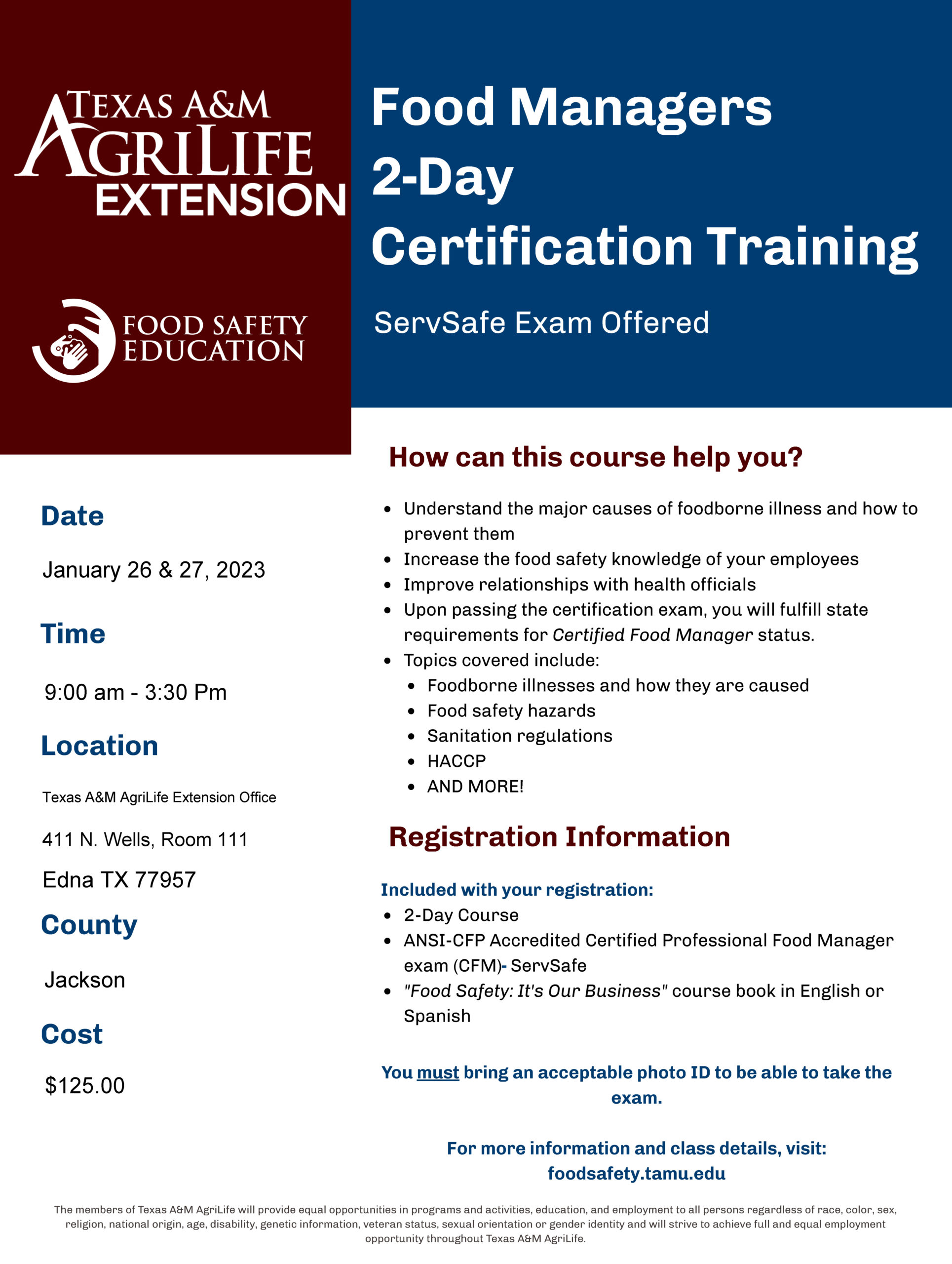Why a Food Manager Certification is Crucial for Dining Establishment Professionals
Why a Food Manager Certification is Crucial for Dining Establishment Professionals
Blog Article
Certified Food Manager: The Trick to Safe and Compliant Procedures
The duty of a Qualified Food Manager (CFM) is progressively acknowledged as necessary in maintaining compliant and secure procedures within the food service sector. By applying rigorous food handling and prep work criteria, CFMs play a pivotal function in mitigating threats connected with foodborne ailments and guaranteeing adherence to regulatory needs. The influence of their know-how prolongs past conformity; it promotes an atmosphere of accountability and operational effectiveness. Understanding the full scope of their contributions raises questions about the wider implications for businesses and consumer trust in food safety and security practices.
Role of a Licensed Food Manager
The duty of a Certified Food Supervisor is crucial in ensuring food safety and conformity within food service establishments. These specialists are in charge of looking after all elements of food handling, storage space, and prep work, guaranteeing that facilities stick to wellness guidelines and industry standards. Their training equips them with the expertise to acknowledge possible threats, execute correct food safety and security methods, and keep hygiene protocols.
Qualified Food Managers play a crucial function in training and monitoring kitchen staff, instilling a society of security and conformity throughout the establishment. They carry out routine inspections to determine areas that call for improvement and make sure that corrective actions are carried out promptly - ServSafe Food Manager Certification. Furthermore, they are entrusted with creating and imposing standard procedure (SOPs) associated to food safety, which offer as an overview for staff members
Their expertise reaches monitoring food temperature levels, protecting against cross-contamination, and managing allergen controls, every one of which are important to safeguarding public wellness. Moreover, Licensed Food Supervisors are typically the key point of get in touch with throughout health examinations, representing their facilities and dealing with any type of conformity problems elevated by health officials. Ultimately, their dedication to food safety and security is crucial for keeping consumer depend on and guarding the online reputation of food service companies.
Significance of Food Safety And Security
Food security is consistently a leading concern in the food service industry, as it straight influences public health and customer confidence. Making certain that food is managed, prepared, and saved securely helps to avoid foodborne ailments, which can cause serious wellness issues and even casualties. The financial repercussions of foodborne outbreaks can be incredible, causing expensive recalls, legal actions, and considerable damages to a company's reputation.
Furthermore, food safety and security techniques cultivate a culture of responsibility and professionalism and trust within food facilities. When workers are educated in appropriate food dealing with techniques, they are most likely to stick to safety and security procedures, which decreases the danger of contamination. This not just shields customers but additionally boosts functional effectiveness and conformity with regional health and wellness guidelines.
Consumer understanding pertaining to food safety has boosted substantially, resulting in enhanced expectations for transparency and top quality in food service. Facilities that focus on food safety are extra most likely to gain customer trust fund and commitment, eventually adding to their lasting success. Investing in robust food security procedures is not simply a regulative commitment; it is a fundamental company approach that benefits both customers and food service drivers alike.
Training and Accreditation Refine
Understanding the training and qualification procedure for food supervisors is vital for maintaining high requirements of food security within any facility. The procedure usually starts with comprehensive training programs that cover important subjects such as foodborne ailments, proper food managing strategies, and sanitation techniques. ServSafe Manager. These programs can be provided via you could look here various layouts, including on the internet programs, in-person classes, or workshops, and are created to outfit food managers with the expertise required to stop food safety risks
Upon conclusion of the training, prospects need to pass a qualification test, which examines their understanding of food security principles and policies. The exam is normally provided by certified organizations, ensuring that the accreditation is acknowledged and appreciated within the market.
Once licensed, food supervisors are called for to stay existing with recurring education and learning and training to preserve their credentials. This might include participating in correspondence course or joining workshops that address new food security methods and guidelines. On the whole, a robust training and qualification procedure not only enhances the abilities of food supervisors yet also adds to the general security and compliance of food procedures in any type of facility.
Compliance With Rules
Conformity with policies is an important facet of a food supervisor's obligations, as it makes certain that facilities follow regional, state, and government food safety standards. These regulations are developed to minimize dangers connected with foodborne diseases and advertise risk-free food taking care of methods. A certified food manager (CFM) plays a crucial role in interpreting and my explanation executing these standards within their procedures.

CFMs must likewise develop and carry out surveillance systems to routinely evaluate conformity with food safety and security methods. This may include regular examinations, document keeping, and training sessions for team to enhance safe food taking index care of procedures (ServSafe Manager). Additionally, in case of a regulatory examination, a CFM's preparedness can substantially influence the result, as they will be responsible for showing adherence to all appropriate guidelines. Inevitably, reliable compliance monitoring fosters a society of security and liability within food solution procedures.

Benefits of Working With CFMs
Working with qualified food managers (CFMs) uses significant benefits for food service establishments seeking to enhance their operational effectiveness and safety and security requirements. CFMs have specialized understanding of food safety regulations, sanitation techniques, and risk monitoring, making certain compliance with regional and government legislations. This competence helps in reducing the probability of infractions that can result in momentary closures or costly penalties.
In addition, CFMs play a vital duty in training team, fostering a society of food safety and security within the establishment. They carry out standardized procedures, monitor food dealing with methods, and carry out routine audits, dramatically lowering the risk of foodborne illnesses. This not just safeguards patrons yet likewise enhances the establishment's reputation.
Additionally, working with CFMs can result in enhanced functional effectiveness. Their training allows team to work extra efficiently, minimizing waste and optimizing efficiency. Establishments with certified food managers commonly experience higher customer satisfaction, as trained employees are much better geared up to make sure top quality solution and food security.

Inevitably, purchasing a certified food manager is an investment in the long-term success and sustainability of a food solution procedure, creating a more secure environment for both staff members and consumers.
Final Thought
In conclusion, the duty of a Licensed Food Manager is important in keeping compliant and risk-free food service operations. Via reliable oversight of food handling techniques, continuous personnel training, and adherence to governing criteria, CFMs play an essential role in mitigating foodborne health problem risks. The investment in licensed management not only improves functional performance however additionally cultivates a culture of liability, eventually benefiting both the establishment and its customers while promoting public health and wellness and safety.
The duty of a Certified Food Supervisor is critical in ensuring food safety and security and compliance within food service facilities.Recognizing the training and certification procedure for food supervisors is crucial for maintaining high standards of food safety and security within any kind of establishment. In general, a robust training and qualification procedure not only boosts the skills of food managers yet also adds to the general safety and security and compliance of food operations in any kind of facility.
Working with qualified food managers (CFMs) uses considerable benefits for food service establishments looking for to improve their operational effectiveness and safety standards. Establishments with qualified food supervisors usually experience greater client contentment, as trained employees are much better geared up to ensure high quality solution and food safety and security.
Report this page